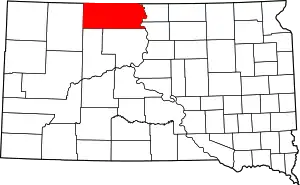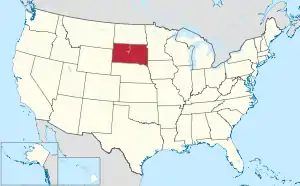Corson County, South Dakota
Corson County is a county in the U.S. state of South Dakota. As of the 2020 census, the population was 3,902.[1] Its county seat is McIntosh.[2] The county was named for Dighton Corson, a native of Maine, who came to the Black Hills in 1876, and in 1877 began practicing law at Deadwood.
Corson County | |
|---|---|
 Corson County Courthouse in McIntosh, South Dakota in 1993. This building was destroyed by fire on April 10, 2006. | |
 Location within the U.S. state of South Dakota | |
 South Dakota's location within the U.S. | |
| Coordinates: 45°43′N 101°11′W | |
| Country | |
| State | |
| Founded | 1909 |
| Named for | Dighton Corson |
| Seat | McIntosh |
| Largest city | McLaughlin |
| Area | |
| • Total | 2,530 sq mi (6,600 km2) |
| • Land | 2,470 sq mi (6,400 km2) |
| • Water | 60 sq mi (200 km2) 2.4% |
| Population (2020) | |
| • Total | 3,902 |
| • Estimate (2022) | 3,826 |
| • Density | 1.5/sq mi (0.60/km2) |
| Time zone | UTC−7 (Mountain) |
| • Summer (DST) | UTC−6 (MDT) |
| Congressional district | At-large |
| Website | corson |

The county is encompassed within the Standing Rock Indian Reservation, which extends into North Dakota. The Lakota people reside primarily in the South Dakota part of the reservation; the Yanktonai and Dakota live in that part in North Dakota. The Grand River, a tributary of the Missouri River, runs through the reservation.
Geography
Corson County lies on the north line of South Dakota. Its north boundary line abuts the south boundary line of the state of North Dakota. The Missouri River flows south-southeastward along its eastern boundary line. The county terrain consists of semi-arid rolling hills. A portion of the land is dedicated to agriculture.[3] The Grand River flows eastward through the central part of the county to discharge into the river, and Standing Cloud Creek flows eastward through the county's lower SW area. The terrain generally slopes to the east and south; its highest point is near its NW corner, at 2,582 ft (787 m) ASL.[4]
Corson County has a total area of 2,530 square miles (6,600 km2), of which 2,470 square miles (6,400 km2) is land and 60 square miles (160 km2) (2.4%) is water.[5] It is the fifth-largest county in South Dakota by area. The entire county lies within the Standing Rock Indian Reservation, which also includes Sioux, Ziebach, and Dewey counties.
The eastern portion of South Dakota's counties (48 of 66) observe Central Time; the western counties (18 of 66) observe Mountain Time. Corson County is the easternmost of the SD counties to observe Mountain Time.[6]
Major highways
Adjacent counties
- Sioux County, North Dakota – north (eastern half of county observes Central Time)
- Campbell County – east (observes Central Time)
- Walworth County – southeast (observes Central Time)
- Dewey County – south
- Ziebach County – southwest
- Perkins County – west
- Adams County, North Dakota – northwest
Protected areas
- Grand River National Grassland (partial)
- C.C. Lee State Game Production Area
Lakes
- Mallard
- McGee
- McIntosh
- Morristown East
- Morristown West
- Lake Oahe (part)
- Pudwell
- Trail City
Rivers and Streams
- Missouri River
- Grand River
- White Shirt Creek
- Hump Creek
- Stink Creek
- Black Horse Butte Creek
- Soldier Creek
- Firesteel Creek
- Oak Creek
- Rock Creek
- Cottonwood Creek
- High Bank Creek
Peaks
- Hump Butte
- Black Horse Butte
- Rattlesnake Butte
- Elk Butte
Demographics
| Census | Pop. | Note | %± |
|---|---|---|---|
| 1910 | 2,929 | — | |
| 1920 | 7,249 | 147.5% | |
| 1930 | 9,535 | 31.5% | |
| 1940 | 6,755 | −29.2% | |
| 1950 | 6,168 | −8.7% | |
| 1960 | 5,798 | −6.0% | |
| 1970 | 4,994 | −13.9% | |
| 1980 | 5,196 | 4.0% | |
| 1990 | 4,195 | −19.3% | |
| 2000 | 4,181 | −0.3% | |
| 2010 | 4,050 | −3.1% | |
| 2020 | 3,902 | −3.7% | |
| 2022 (est.) | 3,826 | [7] | −1.9% |
| U.S. Decennial Census[8] 1790-1960[9] 1900-1990[10] 1990-2000[11] 2010-2020[1] | |||
2020 census
As of the census of 2020, there were 3,902 people.
2010 census
As of the census of 2010, there were 4,050 people, 1,260 households, and 939 families in the county. The population density was 1.6 inhabitants per square mile (0.62/km2). There were 1,540 housing units at an average density of 0.6 per square mile (0.23/km2). The racial makeup of the county was 67.0% American Indian, 29.7% white, 0.3% Asian, 0.1% black or African American, 0.3% from other races, and 2.6% from two or more races. Those of Hispanic or Latino origin made up 2.6% of the population. In terms of ancestry,
Of the 1,260 households, 45.6% had children under the age of 18 living with them, 40.6% were married couples living together, 21.9% had a female householder with no husband present, 25.5% were non-families, and 22.7% of all households were made up of individuals. The average household size was 3.21 and the average family size was 3.73. The median age was 29.7 years.
The median income for a household in the county was $30,877 and the median income for a family was $36,500. Males had a median income of $32,037 versus $23,167 for females. The per capita income for the county was $13,359. About 24.1% of families and 35.1% of the population were below the poverty line, including 46.7% of those under age 18 and 16.9% of those age 65 or over.
Communities

Cities
- McIntosh (county seat)
- McLaughlin
Town
Census-designated places
Unincorporated communities
- Athboy
- Black Horse
- Jeffrey
- Keldron
- Mahto
- Maple Leaf
- Miscol[12]
- Snake Creek
- Thunder Hawk
- Trail City
- Walker
- Watauga
Townships
- Custer
- Delaney
- Lake
- Mission
- Pleasant Ridge
- Prairie View
- Ridgeland
- Rolling Green
- Sherman
- Wakpala
- Watauga
Unorganized territories
- Central Corson
- Lemmon No. 2
- Northeast Corson
- West Corson
Politics
In the 2020 presidential election, Corson County was the county or equivalent with the highest percentage of Native Americans which Donald Trump won, after Joe Biden flipped Ziebach County.
| Year | Republican | Democratic | Third party | |||
|---|---|---|---|---|---|---|
| No. | % | No. | % | No. | % | |
| 2020 | 647 | 50.43% | 622 | 48.48% | 14 | 1.09% |
| 2016 | 588 | 50.04% | 535 | 45.53% | 52 | 4.43% |
| 2012 | 515 | 42.92% | 648 | 54.00% | 37 | 3.08% |
| 2008 | 535 | 38.05% | 837 | 59.53% | 34 | 2.42% |
| 2004 | 720 | 41.76% | 972 | 56.38% | 32 | 1.86% |
| 2000 | 629 | 50.60% | 549 | 44.17% | 65 | 5.23% |
| 1996 | 533 | 41.00% | 539 | 41.46% | 228 | 17.54% |
| 1992 | 483 | 38.61% | 444 | 35.49% | 324 | 25.90% |
| 1988 | 710 | 49.03% | 722 | 49.86% | 16 | 1.10% |
| 1984 | 955 | 54.48% | 792 | 45.18% | 6 | 0.34% |
| 1980 | 1,233 | 66.47% | 522 | 28.14% | 100 | 5.39% |
| 1976 | 846 | 46.41% | 967 | 53.04% | 10 | 0.55% |
| 1972 | 975 | 58.28% | 689 | 41.18% | 9 | 0.54% |
| 1968 | 1,108 | 55.15% | 821 | 40.87% | 80 | 3.98% |
| 1964 | 1,034 | 43.78% | 1,328 | 56.22% | 0 | 0.00% |
| 1960 | 1,290 | 54.13% | 1,093 | 45.87% | 0 | 0.00% |
| 1956 | 1,394 | 55.63% | 1,112 | 44.37% | 0 | 0.00% |
| 1952 | 1,757 | 69.01% | 789 | 30.99% | 0 | 0.00% |
| 1948 | 1,154 | 49.63% | 1,154 | 49.63% | 17 | 0.73% |
| 1944 | 1,008 | 56.19% | 786 | 43.81% | 0 | 0.00% |
| 1940 | 1,709 | 56.27% | 1,328 | 43.73% | 0 | 0.00% |
| 1936 | 1,408 | 42.73% | 1,781 | 54.05% | 106 | 3.22% |
| 1932 | 946 | 27.15% | 2,403 | 68.97% | 135 | 3.87% |
| 1928 | 1,847 | 56.92% | 1,374 | 42.34% | 24 | 0.74% |
| 1924 | 1,364 | 56.50% | 140 | 5.80% | 910 | 37.70% |
| 1920 | 1,448 | 60.89% | 484 | 20.35% | 446 | 18.76% |
| 1916 | 503 | 42.20% | 641 | 53.78% | 48 | 4.03% |
| 1912 | 0 | 0.00% | 455 | 44.26% | 573 | 55.74% |
References
- "State & County QuickFacts". United States Census Bureau. Retrieved August 15, 2023.
- "Find a County". National Association of Counties. Archived from the original on May 31, 2011. Retrieved June 7, 2011.
- Corson County SD Google Maps (accessed February 1, 2019)
- ""Find an Altitude" Google Maps (accessed February 1, 2019)". Archived from the original on May 21, 2019. Retrieved February 1, 2019.
- "2010 Census Gazetteer Files". United States Census Bureau. August 22, 2012. Retrieved March 23, 2015.
- Map of Time Zone Line through South Dakota (accessed January 30, 2019)
- "Annual Estimates of the Resident Population for Counties: April 1, 2020 to July 1, 2022". Retrieved April 2, 2023.
- "U.S. Decennial Census". United States Census Bureau. Retrieved March 23, 2015.
- "Historical Census Browser". University of Virginia Library. Retrieved March 23, 2015.
- Forstall, Richard L., ed. (March 27, 1995). "Population of Counties by Decennial Census: 1900 to 1990". United States Census Bureau. Retrieved March 23, 2015.
- "Census 2000 PHC-T-4. Ranking Tables for Counties: 1990 and 2000" (PDF). United States Census Bureau. April 2, 2001. Archived (PDF) from the original on October 9, 2022. Retrieved March 23, 2015.
- Miscol SD Google Maps (accessed February 1, 2019)
- Leip, David. "Atlas of US Presidential Elections". uselectionatlas.org. Retrieved April 13, 2018.